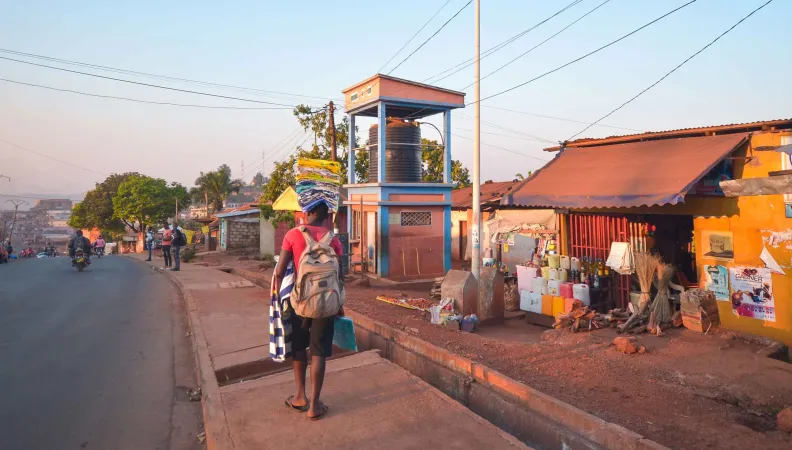Share the page
AFD Group in Cameroon: The Fruits of a Long-Standing Alliance
Published on

French President Emmanuel Macron visited Cameroon on 25 July to discuss food security, a critical issue on the development agenda. AFD Group has maintained close ties with Cameroon, supporting several emblematic projects across the country. Cameroon’s economy is dynamic and continues to flourish in spite of the ongoing challenges caused by the Covid-19 crisis and its aftermath.
Strategically located at the crossroads of West and Central Africa, Cameroon has abundant natural and human resources that the country has managed to use to its advantage. A longstanding ally of France, Cameroon has successfully integrated itself into the global economy and has established commercial ties across Asia, the Middle East, Western and Eastern Europe.
This dynamism allows Yaoundé to continue to boost its economic growth, expected to reach 4% this year, and largely thanks to the successful diversification of its economy. Despite the lasting impact of the international economic crisis, this growth reflects a number of important triumphs. It also suggests that the positive impact of the long-standing alliance between Cameroon and the Agence Française de Développement Group has borne fruit.
Developing rural entrepreneurship and quality of life.
With the Acefa program, one of the three programs financed under Cameroon's Debt Reduction and Development Contract (C2D) for small-scale family farms, AFD sought to improve the productivity and living conditions of agro-entrepreneurs. Beneficiaries have seen their income increase by up to 43%. The Afop program creates 1.5 CFA francs of wealth each year for each CFA franc invested in developing productivity. Additionally, 89 million euros have been channelled towards training 17,000 young people, creating 4,000 direct jobs and 7,000 indirect jobs. Cameroon, a major historical partner of AFD Group, has benefited from 524 million euros of investments in rural entrepreneurship development since 1998.
Making cities more attractive: urban development.
In Yaoundé and Douala, the 538 million euros invested by AFD over fifteen years have financed essential urban road and sanitation infrastructure in order to provide businesses with an adequate framework for generating growth and prosperity. To support the development of secondary cities, the "Regional Capitals" program has mobilized 215 million euros over ten years to improve the living conditions of urban populations in five regional capitals. The emphasis is on financing the transport network to make these urban centers more accessible. Urban development is particularly crucial in the context of the increasing impact of Climate Change. Towns will need to adapt to increasing temperatures, and extreme weather events, such as flooding and sustained heatwaves. Building development projects that can support urban transformation, including durable infrastructure, is more important than ever.
Enhancing tangible and intangible cultural heritage
Cameroon has an abundant natural and historical heritage, as well as an extraordinary diversity and cultural richness. However, the culture and heritage development sectors still need to be developed so that the country can fully benefit from the positive impact of these assets. This is one of the missions that AFD is supporting through two flagship programs: support for the development of the Yaoundé National Museum, and the development of the Chieftaincy Route. These projects will help to develop the potential of the tourism industry, by boosting the attractiveness of less-known regions and diversifying the investments into new areas of the Cameroonian economy.
Education: reversing the dropout curve
AFD has invested 244 million euros over the past 15 years to ensure a good level of basic education in Cameroon. As a result, 4 301 classrooms have been built and no less than 37 200 teachers recruited, ensuring Cameroonian schools are places of inclusion and social progress. Dropping out of school is one of the country's greatest challenges in primary education. The lack of teachers, the lack of school buildings compounded with demographic pressure all add to the difficulties of building a stable and solid education system. AFD's investments enable the deployment of a fair, accessible and sustainable education system, targeting priority education zones, where the needs are greatest.
In addition to the support offered to the various sectors of Cameroonian society by AFD Group, the country can now enjoy sustainable support from its development partners. In particular, the International Monetary Fund (IMF) has approved a three-year financing agreement under the Extended Fund Facility for a total of $690 million in 2021. This announcement augurs a more ambitious public investment policy for Cameroon.
